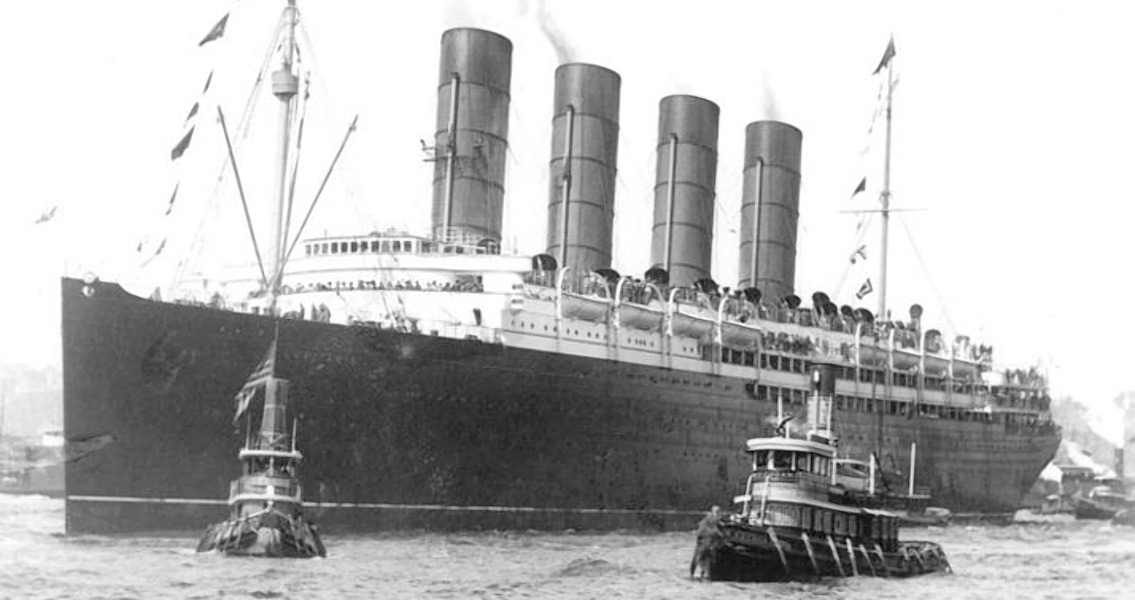<![CDATA[On 21st July 1915, US President Woodrow Wilson submitted his third protest over the sinking of the RMS Lusitania to Germany. It heralded a pivotal step in the process that eventually resulted in the US' involvement in the First World War, a process which to this day is still subject to conspiracy theories. The RMS Lusitania was sunk by a torpedo from a German U-boat on 7th May 1915, en route from New York to Liverpool. Of the more than 1,900 passengers and crew on board, over 1,100 perished including 120 US citizens. It triggered a change in public opinion towards Germany in the USA and is widely considered a key moment in the USA's decision to join the First World War in 1917. Since the outbreak of the First World War in Europe, Wilson's USA had pledged neutrality, continuing the isolationist trend to its foreign policy that had dominated since the late nineteenth century. Nevertheless, Britain remained a crucial trading partner and Germany's attempts to block off all shipping to the UK through U-boat patrols quickly led to tensions between Berlin and Washington D.C. Unrestricted submarine warfare in British waters was announced by Germany in 1915, putting any ship heading to Britain in danger. To reinforce the threat, the German foreign office took out an advertisement in several New York newspapers warning US citizens of the dangers of trans-Atlantic travel. Poignantly, the warning appeared next to advertisements for the Lusitania. It was in this context that the Lusitania was torpedoed at 2:12pm on 7th May. Seconds after the initial impact, a second explosion tore through the ship, wrecking the hull. Within twenty minutes the ship had completely sunk, and American public opinion turned to events in Europe. Six days after the sinking, Wilson's government sent the first of its diplomatic protests to the German government. The German response was swift, claiming the Lusitania had been carrying 173 tonnes of war munitions for use against German troops, making the ship a legitimate target. Decades later, documents released by the British Navy confirmed that the Lusitania had indeed been carrying munitions. "It is, moreover, known to the Imperial Government from reliable information furnished by its officials and neutral passengers that for some time practically all the more valuable English merchant vessels have been provided with guns, ammunition and other weapons, and reinforced with a crew specially practiced in manning guns. According to reports at hand here, the Lusitania when she left New York undoubtedly had guns on board which were mounted under decks and masked.", read the German response. A follow-up note was sent by the US Secretary of State William Jennings Bryan, challenging the assumptions of the German reply. Then, on 21st July, Wilson wrote his own protest to the German government, warning that any future infringement of US rights would be deemed 'deliberately unfriendly'. Relations between the US and Germany seemed to thaw after Wilson's third note, at least slightly, and especially after Germany agreed to cancel its 'unrestricted warfare' in the waters off of Britain. However, Jennings Bryan had resigned as Secretary of State, convinced that Wilson was deliberately trying to pull the US into the war in Europe, while public opinion towards Germany had undoubtedly changed in the wake of the sinking of the RMS Lusitania. In January 1917, Germany announced it would resume unrestricted warfare in the waters of the warzone in a desperate attempt to bring Britain to its knees. Three days later, the US broke off diplomatic relations with Germany. Over the following months, five more US ships were sunk on voyages to and from Great Britain. By 6th April, both the Senate and the House of Representatives had voted to join the war against Germany and its allies. Almost as soon as the Lusitania had sunk, conspiracy theories started to appear that the luxury liner's fate was not as simple as would seem at first glance. Some claimed that the second explosion immediately following the torpedo strike had been a bomb, while other theories argue the British Navy deliberately left the ship unescorted in the perilous waters, knowing that if it were attacked it could pull the USA into the war. The sinking of the Lusitania did not lead directly to the US entering the First World War, but as the protest sent by Wilson on 21st July 1915 shows, it had seriously soured relations between the White House and Berlin, placing the USA precariously close to the conflict in Europe. ]]>
Wilson Protests Sinking of the RMS Lusitania
